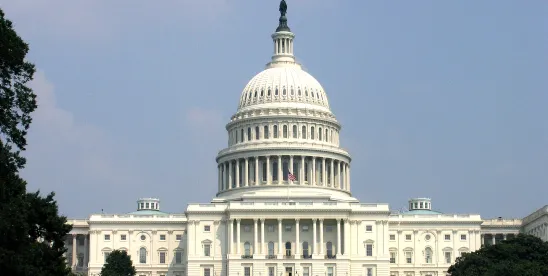On Wednesday, June 12, 2024, the U.S. House of Representatives, voted to hold U.S. Attorney General Merrick Garland in contempt of Congress for the Department of Justice’s refusal to turn over audio recordings of President Biden’s interview with Special Counsel Robert K. Hur. This vote comes shortly after U.S. Courts rebuffed appeals by former advisors to President Trump, Dr. Peter Navarro and Steve Bannon, who were both sentenced to serve four months in federal prison after refusing to cooperate with Congressional demands.
Garland, Navarro, and Bannon each relied on Executive Privilege as the basis for their noncompliance with a Congressional subpoena. Under U.S. law, it is a misdemeanor criminal offense to willfully fail to comply with a valid Congressional subpoena for producing documents or testimony. While the U.S. Constitution does not expressly confer executive privilege, the Supreme Court has described the privilege as “deriv[ing] from the supremacy of each branch within its own assigned area of constitutional duties,” and that it is “fundamental to the operation of Government,” and also “inextricably rooted in the separation of powers under the Constitution.” United States v. Nixon, 418 U.S. 683, 705, 708 (1974). Thus, Congress must respect a proper invocation of executive privilege; however, this privilege is narrowly construed and can only be asserted by the President for his communications and potentially those of his most senior advisors1 for national security needs or for “protecting the privacy of White House deliberations when it is in the public interest.”
On January 8, 2021, the Office of Legal Counsel within the Department of Justice wrote a Memorandum to the President, Congressional Oversight of the White House, which extensively discussed the historic interactions and precedent between Congress and the White House when Presidential Communications are at issue. Historically, when there is a conflict between the two co-equal Branches, negotiation occurs to satisfy each Branch’s needs and interests. This tradition of negotiation and compromise has come to be known as the accommodation process.
This tradition of accommodation is also available to targets of Congressional investigation who may not occupy the residence at 1600 Pennsylvania Ave, before a Congressional subpoena is issued.
Congressional Subpoenas
The power to issue a Congressional subpoena resides in the Chairs of the various Committees of Jurisdiction and Oversight in Congress. Compliance with a Congressional Subpoena is unlike compliance with a subpoena in the judicial or administrative setting. The Committee Chair issuing the subpoena has a tremendous amount of discretion in determining the scope of the investigation, what arguments of privilege will be recognized, and whether documents shared pursuant to a subpoena are granted confidentiality protections.
Ultimately, Congress is only obligated to recognize executive privilege and generally maintains that they are not obligated to recognize common law privileges such as attorney-client and attorney work product. However, recent dicta from Supreme Court rulings suggests that common law privileges should still carry some weight.
Consequences of Non-Compliance
The legal force behind Congress’s subpoena power is its ability to hold a target that does not comply with an investigation in contempt. Congress has three methods of contempt it can utilize to compel compliance with an investigation. The U.S. Senate can exercise its civil contempt authority under 2 U.S.C. § 288(d) and direct Senate legal counsel to bring an action in Federal Court. Failure to comply after a finding of civil contempt could subject an individual with charges of contempt of court. Second, either chamber of Congress could pass a Contempt of Congress Resolution, essentially referring the recalcitrant witness to an U.S. Attorney, who then has discretion to bring criminal charges. Lastly, Congress has the rarely used option of inherent contempt to compel compliance. Under inherent contempt, the Sergeant-at-Arms could detain the recalcitrant witness in its custody. Inherent contempt was last used in 1935. While arcane, the Supreme Court has found that inherent contempt is implicit as an essential legislative power held by Congress.
Discussion:
To better understand the investigative powers of Congress, this article explores the key facts of each case of Contempt of Congress and identifies broader considerations for congressional inquiries.
Attorney General Garland is Held in Contempt of Congress
Last week’s contempt vote against Attorney General Garland originated with a high stakes dispute over the Department of Justice’s refusal to turn over to Congress audio recordings made by Special Counsel Robert Hur during his investigation of President Biden’s handling of classified material. On May 16, 2024, President Biden asserted executive privilege over the recording. However, the House contends that the privilege was waived when the Department of Justice turned over the written transcripts and moved forward with contempt proceedings. According to Press accounts, the Department of Justice issued an internal memorandum that stated:
For nearly seven decades and across presidential administrations of both parties, the Executive Branch has taken the position that the criminal contempt of Congress statute … does not apply to Executive Branch officials who do not comply with a congressional subpoena based on a presidential assertion of executive privilege.
The memorandum reportedly further asserts that contempt of Congress largely serves as a recommendation to the Justice Department—which must then weigh whether to bring charges—making it unlikely that the Assistant U.S. Attorney for the District of Columbia will pursue criminal liability against the Attorney General.
Steve Bannon Files an Emergency Appeal Before Reporting to Jail
In a contrasting case, a former top advisor to President Trump, Steve Bannon, was convicted of contempt of Congress in 2022 after failing to provide documents and testimony to the House Select Committee that investigated the January 6, 2021 U.S. Capitol Attack. An important distinction between the cases is that the testimony in question only pertained to Bannon’s actions as a private citizen, and not any actions in an official capacity. Moreover, President Trump did not assert executive privilege over the communications in question before the expiration of the Committee’s deadline.
The Justice Department, led by Garland, charged Bannon with contempt following the House of Representatives’ vote to send a criminal referral for his non-compliance for prosecution. Bannon has since been sentenced to four months in prison. In June, a federal judge ordered Bannon to report to jail no later than July 1, after Bannon lost an appeal to the D.C. Court of Appeals. On Tuesday, June 11, 2024 in an emergency filing to the U.S. Court of Appeals for the District of Columbia, counsel for Bannon argued that he “relied in good faith on his lawyer’s advice and believed his actions were in compliance with the law,” therefore obviating the mens rea necessary for a criminal conviction.
Peter Navarro is Serving Time in Federal Prison
Former advisor to President Trump, Peter Navarro was also held in contempt of Congress for failing to cooperate with the Select Committee investigating the January 6, 2021 U.S. Capitol Attack. In his criminal trial, Navarro was barred from arguing that he believed he was bound by executive privilege when he defied the Committee’s subpoena, as the judge overseeing the case found there was no evidence that the privilege was ever asserted. Moreover, the Committee argued that it had asked Navarro about many subjects not related directly to his conversations with the President, which could not be subject to executive privilege.
In March 2024, the Supreme Court denied a request by Navarro to get out of jail while he appeals his four-month sentence for defying a subpoena issued by the Select Committee. Chief Justice John Roberts made it clear that he denied the motion because of procedural concerns specific to Dr. Navarro’s case, which were “distinct from his pending appeal on the merits.” Navarro’s appeal on the merits of his criminal conviction is still pending.
Key Takeaways: The Need for Expert Guidance
These recent high stakes controversies and criminal implications stemming from Congressional investigations demonstrates the complexities in navigating a Congressional inquiry. As noted by the Congressional Research Service, executive privilege disputes, like any disputes related to a Congressional investigation, are inherently political and “[t]he vast majority of these disputes are resolved through political negotiation and accommodation.”
When Congress initiates an inquiry, an initial request letters typically provides an exceedingly short time to respond, traditionally within two weeks of receipt. While this deadline is often negotiable, the optimal time to prepare for a Congressional investigation is before you hear from Congress. Understanding potential political risks allows a company’s leaders to proactively take steps, on their own schedule, to reduce the impact of an investigation. These steps range from implementing appropriate records retention policies to conducting tabletop exercises, to engaging proactively with advocates on Capitol Hill. Taking these steps before you hear from Congress empowers a confident response, allows for the development of a strategy to diffuse the conflict, and avoids the consequences of receiving a Congressional subpoena. Should Congress request records or testimony, it is still very feasible to come to the table and negotiate an optimal outcome that avoids unnecessary exposure, while also responding to Congress with integrity.
1 The presidential communications component of executive privilege is not limited to exchanges directly involving the President. The Supreme Court emphasized in Nixon that the “President and those who assist him must be free to explore alternatives in the process of shaping policies and making decisions,” 418 U.S. at 708 (emphasis added), and explicitly described the privilege as protecting communications within the President’s “office,” id. at 712–13. See, e.g., Confidentiality of the Attorney General’s Communications in Counseling the President, 6 Op. O.L.C. 481, 485–86, 486 n.11 (1982) (explaining that the presidential communications privilege protects the presidential “decision making process” and, therefore, can apply to the work of presidential advisers).







 />i
/>i

